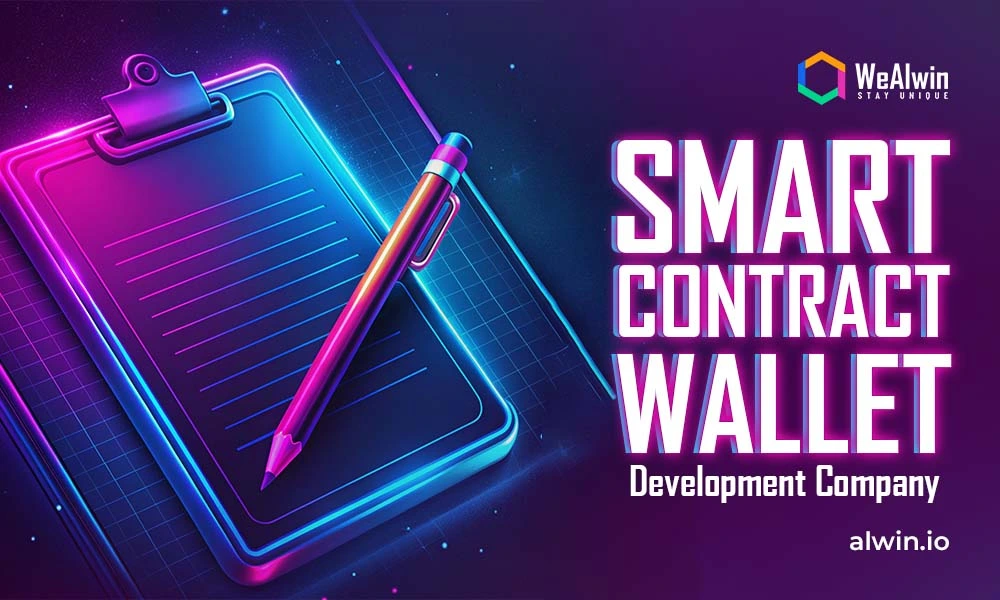In the blockchain ecosystem, smart contract wallets are becoming a strategic asset for businesses by providing automated and secure services. With the growing demand for blockchain wallets, these programmable solutions have become essential tools that help enterprises automate and safeguard their services with ease.
By adopting smart contract wallet development, businesses achieve new levels of automation and security in their financial operations. Unlike traditional wallets, Ethereum smart wallets and other programmable wallets do more than just store digital assets. With secure digital wallet development, tasks such as multi-signature transactions, escrow management, and secure payments become more streamlined. This technology enables businesses to offer safer digital finance solutions, improving user interactions and strengthening customer relationships.
What is a Smart Contract Wallet?
A smart contract wallet is a digital wallet that utilizes smart contract solutions to self-execute agreements based on the terms and conditions embedded in the contract code. Smart contract wallets offer additional functionality by enabling automated and programmable transactions. This means they can execute predefined conditions without intermediaries, leading to faster and more secure transactions.
Smart contract wallets differ from traditional wallets in key ways. Traditional wallets store digital assets and allow users to send and receive cryptocurrency, while smart contract wallets automate these processes and facilitate complex transactions involving multiple parties and conditions. For example, a smart contract wallet can automatically release funds when certain criteria are met, reducing manual intervention and the risk of errors.
Smart Contract Wallet Development Company
Smart contract wallet development involves creating a digital wallet that incorporates smart contract functionality. WeAlwin provides complete cryptocurrency wallet development services, including coding and testing for smart contract wallets. Our Smart contract development services help businesses streamline workflows, automate processes, and reduce operational costs. With knowledge of various smart contract programming languages, we are ready to meet the needs of our clients.
Key Features of Smart Contract Wallets
Smart contract wallets come with various features that make them ideal for businesses seeking to improve their digital transaction capabilities:
1. Wallet Automation
These wallets are programmed to execute transactions automatically when specific conditions are met, such as automatic payments upon delivery of goods or services.
2. Blockchain Wallet Security
Smart contract wallets protect assets from fraud and unauthorized access. Features like multi-signature support and audit trails provide additional confidence in transactions. The introduction of ERC-4337 (account abstraction) allows for more flexible and secure validation processes.
3. Programmable Transactions
Businesses can customize how transactions are processed, enabling complex agreements like conditional payments or phased fund releases.
4. Multi-Currency Support
Many smart contract wallets handle multiple cryptocurrencies, simplifying financial operations for companies working with various digital currencies.
5. User-Friendly Interface
Despite their advanced features, many wallets offer intuitive interfaces, allowing users with limited blockchain experience to interact with ease.
How Smart Contract Wallets Works?
Technology Behind It
Smart contract wallets use blockchain technology to handle secure, automated transactions:
- Blockchain Infrastructure: Built on decentralized networks like Ethereum, ensuring that transactions are transparent and tamper-proof.
- Smart Contracts: Self-executing scripts that define rules and conditions for transactions.
- Integration into Digital Wallets: Smart contracts are embedded into wallets, enabling users to interact with them for secure transactions.
Working Process Flow
- User Interaction: The user initiates a transaction by setting up conditions through the wallet interface.
- Condition Definition: The conditions for the transaction (e.g., escrow) are defined.
- Smart Contract Execution: The contract is deployed on the blockchain and manages the transaction.
- Funds Management: The smart contract wallet holds funds securely until conditions are met.
- Transaction Verification: The contract continuously monitors the status of conditions.
- Fund Release: Upon verification, funds are transferred automatically.
- Completion Notification: Users are notified once the transaction is completed.
Benefits of Smart Contract Wallet Development for Businesses
User Control and Ownership
Users have full control over their assets without dependence on centralized authorities. With private keys, only the wallet owner can access and manage funds, providing true ownership.
Automation of Business Processes
Tasks such as payroll processing and contract execution are streamlined, reducing time and effort.
Security
The immutability and transparency of blockchain significantly reduce fraud risk, ensuring secure transactions.
Cost Savings
Eliminating intermediaries reduces operational costs, improving efficiency and profitability.
Customizable Transactions
Smart contract wallets enable programmable transactions, allowing users to define specific terms and conditions for fund transfers. This includes options like phased payments or agreements involving multiple parties.
Development Process of Smart Contract Wallets
1. Identifying Business Requirements
Entrepreneurs need to outline their needs, audience, and regulatory requirements.
2. Choosing the Right Blockchain Platform
Selecting the appropriate blockchain (e.g., Ethereum) is critical based on factors like scalability and security.
3. Designing the Wallet Architecture
Developers design the wallet with a focus on security and usability.
4. Smart Contract Integration
The integration of smart contracts into the wallet, managing essential functions like fund transfers.
5. Testing and Deployment
Rigorous testing ensures the wallet is bug-free before deployment.
Future Prospects of Smart Contract Wallets
Integration with DeFi and NFTs
Smart contract wallets are positioned to integrate with decentralized finance (DeFi) platforms and non-fungible tokens (NFTs), enabling more complex digital transactions.
Scalability for Enterprises
As businesses grow, smart contract wallets can handle increased transaction volumes, making them suitable for larger organizations.
Popular smart contract wallet in the crypto market
- Safe
- Argent
- Castle
- Dfns
- Candide
- UniPass
- Soul Wallet
- Stackup
- Obvious
- openfort
Conclusion
Smart contract wallet development offers businesses advantages in automating processes, improving security, and reducing costs. As blockchain technology evolves, businesses that adopt smart contract wallets will be well-positioned to optimize their operations and provide better services to customers.WeAlwin is a leading Cryptocurrency wallet development company. If you're seeking an automated and easy-to-use Web3 solution, consider smart contract wallet creation from a trusted blockchain development partner like WeAlwin. As we move toward a future shaped by blockchain technology, smart contract wallets will play a crucial role in transforming the financial landscape and fostering trust. This technology opens up new possibilities for the financial sector, making it an exciting time to explore the potential it offers.



